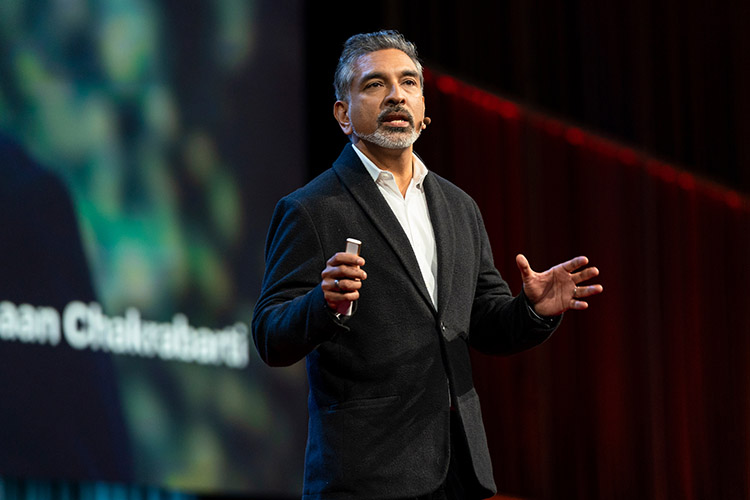Environmental Design gift gives students debt relief, path to public service
Arcus Social Justice Corps will provide graduate students with the financial stability to pursue careers in social justice.
June 10, 2021

Berkeley College of Environmental Design announced today the Arcus Social Justice Corps. The program will provide graduate students with the financial stability to pursue careers in social justice. (Photo courtesy of UC Berkeley College of Environmental Design)
UC Berkeley’s College of Environmental Design (CED) today (June 10) announced a transformative $5.3 million gift, from Berkeley alumnus Jon Stryker, that will fund a four-year fellowship program aimed at providing debt relief to more than 100 graduate students.
The Arcus Social Justice Corps (ASJC) will give CED post-graduates relief from the mounting student loan debt, rising tuition and cost of living that many students face upon graduation. That financial stability will give Arcus Fellows the opportunity to focus on the students’ passions — like reforming housing policy, food accessibility or urban planning — and empower them to pursue social justice careers at groups and institutions that tackle the impacts of social and racial inequities, head-on.
“I’m grateful for this powerful investment from Jon Stryker, which achieves two principal things: It provides significant financial support for students in the College of Environmental Design, and it embeds, in a direct way, Berkeley’s commitment to social justice,” said Chancellor Carol T. Christ. “The Arcus Social Justice Corps is a magnificent idea that will have tremendous impact for our students and the communities they serve.”
Since its inception in 1959, CED has sustained a legacy of educating environmental designers for public service centered on equity, ecology and excellence.

Bauer Wurster Hall houses Berkeley’s CED program. (UC Berkeley photo courtesy of Environmental Design Archives)
As the first school in the nation to house the fields of architecture, landscape architecture and city and regional planning under one roof, students attend CED with the intent to address society’s most pressing urban challenges.
This recent gift enables CED to ensure that Arcus Fellows become front-line social justice practitioners — a programmatic first among major international schools of architecture, landscape architecture and urban planning, said CED Dean Vishaan Chakrabarti.
“Historically, CED has actively involved students in social justice and community-based work throughout their education, but now we can finally guarantee they are financially supported in their endeavors without the burden of overwhelming loan debt,” Chakrabarti said. “The ASJC will ensure that CED fulfills its promise to be an incubator for our brightest minds to, together, create equitable and ecological communities of the future.”
Arcus Fellows will be selected by a CED committee that includes practitioners in social justice and faculty, staff, student and alumni representatives. Every enrolled master’s degree student at CED can apply for an Arcus Fellowship. The first cohort will be selected this fall, and each year thereafter fellows will pledge to work in social justice roles after graduation with the intent to produce work that combats the most pressing societal challenges.
The selection process will take place when prospective students apply for graduate school at Berkeley.
These students will not only receive debt relief, but also a sense of belonging through the building of a community that is dedicated to social justice. The fellowship will offer programming throughout the year for students to incubate new ideas, attend seminars, receive career planning support, engage in community-connected studios and receive direct mentorship from practitioners in the real world.

Berkeley CED Dean Vishaan Chakrabarti. (Photo courtesy of Ryan Lash)
“This inspirational gift from Jon Stryker will not only transform the lives of more than 100 diverse graduate students by giving them the financial freedom, sense of belonging and chops to become social impact professionals, but will improve scores of lives in the communities these Arcus Fellows will serve, as well as the academic life of the college from which they hail,” Chakrabarti added.
Stryker, an architect and philanthropist committed to advancing social justice, human rights and LGBTQ+ efforts globally, earned a Master of Architecture degree in 1989 from CED. In 2016, he was the inaugural recipient of the Catherine Bauer Wurster Award for Social Practice, which recognizes significant achievements of a CED alumnus or alumna to advance social justice, environmental conservation and fair urban development.
For Stryker, ensuring students can pursue community impact through careers in social justice is just the beginning. The enduring impacts of his gift will come from an increase in the number of CED students working in social justice and public service careers and from the inspiration it gives to CED’s faculty and dedicated staff.
“My goal in making this gift is simple — to empower these bright, talented students to live the idealism that attracted them to Berkeley in the first place,” said Stryker. “Their professional fulfillment will have a multiplier effect that will benefit diverse communities, large and small, by removing financial barriers that often exist to those pursuing social justice careers.
“It is my hope that the ASJC fellows are on the front lines as our society works toward a more equitable and sustainable future for all.”
Inspiring models of social justice and public service work can be found in CED’s faculty and visiting lecturers. One is 2018 Rupp Prize winner and visiting professor Deanna Van Buren, whose Oakland-based nonprofit, Designing Justice + Designing Spaces, seeks to end mass incarceration and structural inequity through design and the built environment.

CED professor Charisma Acey (Photo courtesy of UC Berkeley’s College of Environmental Design)
Another is Charisma Acey, associate professor in CED’s Department of City and Regional Planning, whose social justice work focuses on poverty reduction, urban governance, environmental justice, food justice and access to basic services.
As director of the Berkeley Food Institute, Acey is reshaping food systems in the Bay Area and beyond.
“We are committed to centering racial justice in all aspects of our work to transform the industrial agri-food system in ways that heal and protect our urban and rural ecological landscapes and promote a healthy and just society,” said Acey.
Arcus Fellows will lead a dynamic social justice movement within Bauer Wurster Hall to inspire all CED students — undergraduate and graduate, across all disciplines and backgrounds, and those planning more traditional career paths. The hope is that Arcus Fellows will return to CED in the years to come to mentor future cohorts of students who want to pursue public service work in the real world.
CED lecturer Emily Pilloton founded Girls Garage, a Berkeley-based nonprofit that teaches girls technical and design skills to empower them to build and create for their communities. Pilloton, a 2003 CED alumna, said the powerful intersection of social justice and design education has the potential to revolutionize the industry.
“As the world expands its understanding of race, gender, socioeconomics and how these things show up in our built environments, we will need a ferocious corps of new designers who enter into these spaces with humility, commitment and truly diverse ways of seeing things anew,” Pilloton. “The ASJC program will build an entire cohort of creative social justice warriors — it is a boon for design education and a hopeful step toward new models of imagining what it means to be a designer.”
CED students interested in learning more about the fellowship program can visit the website page here.